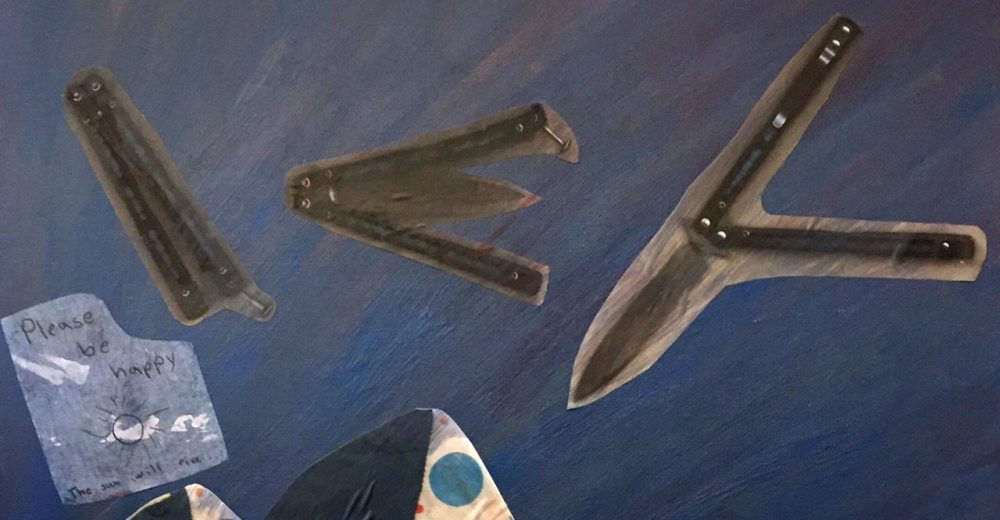Advertisement
Turning Grief Into Art After Losing A Loved One To Opioid Overdose

With more than five people dying of an opioid overdose every day in Massachusetts, a local artist and doctor are helping people use art to express their grief.
They're holding workshops around the state incorporating art and audio recordings together to express some of the profound feelings around what are often stigmatized deaths.
At an exhibit of the artwork at Newton's New Art Center, about a dozen canvases line the walls. Each 20-by-20-inch square remembers someone who has died of an opioid overdose.
Some of the squares are painted, some contain personal belongings of the person, most look like collages. The canvases are paired with audio recordings telling the story of the person symbolized by the art.
"He came to us and said, 'I have to tell you something. I'm addicted to heroin,' " remembers Robyn Houston-Bean, of Braintree. She created a work in memory of her 20-year-old son, Nick.
"The emotion that he showed at that moment and the vulnerability of not being in control and not being able to help himself was very hard to see," she says.
Her painted blue canvas has images of the pocket knives Nick used to collect, a clown hat he wore as a child and a note he wrote to himself while in recovery saying, "Please be happy. The sun will rise."
In the audio recording that accompanies her work, Houston-Bean describes her son as a "brilliant soul" who was derailed by drugs in college. Nick was drug-free for seven months and seemed to be doing well.
"Everything was clicking right. And he relapsed once and passed away," she says. "I love him and I miss him so much, but he knows that because I live every day trying to do something. I do it in his memory so everybody knows about Nick and knows about Nick's story and that it can happen to that boy next door."
Reducing the stigma of opioid overdoses and helping support the loved ones of those who have overdosed are the main objectives of this project, which was created by artist Nancy Marks and Dr. Annie Brewster.
They say after seeing so many people isolate in shame after an overdose death of a loved one, they wanted to help. So they invite loved ones to free workshops where Marks helps with the canvases while Brewster helps people tell stories about the person they want to memorialize.
"Our main No. 1 goal with this project is to really contextualize these people who've been lost to opioid overdose," Brewster says. "So I think having the stories shared in different mediums is doing just that."
Marks says she starts each workshop asking the participants to say one word about what they're feeling as they prepare to create art to express their loss.
"Often times the words that come out are: nervous, sad, devastated," she says.
After a four-hour workshop they're also asked to sum up their feelings in one word.
Advertisement
"The words are pretty amazing because oftentimes they're words like peaceful, cathartic and calm," Marks says. "For Annie and I we feel like that's all we need in that moment to have somebody come in feeling so sad and then at the end of the time find a place of calm in them is a gift."
Both Marks and Brewster say their ultimate goal is to hold workshops around the state culminating with an exhibit at the State House.
The project is called "The Intimacy of Memory: Reframing Loss and Overcoming Stigma in the Face of Opioid Overdose." It's on display at the New Art Center in Newton until Saturday, Dec. 3.
This segment aired on November 18, 2016.
